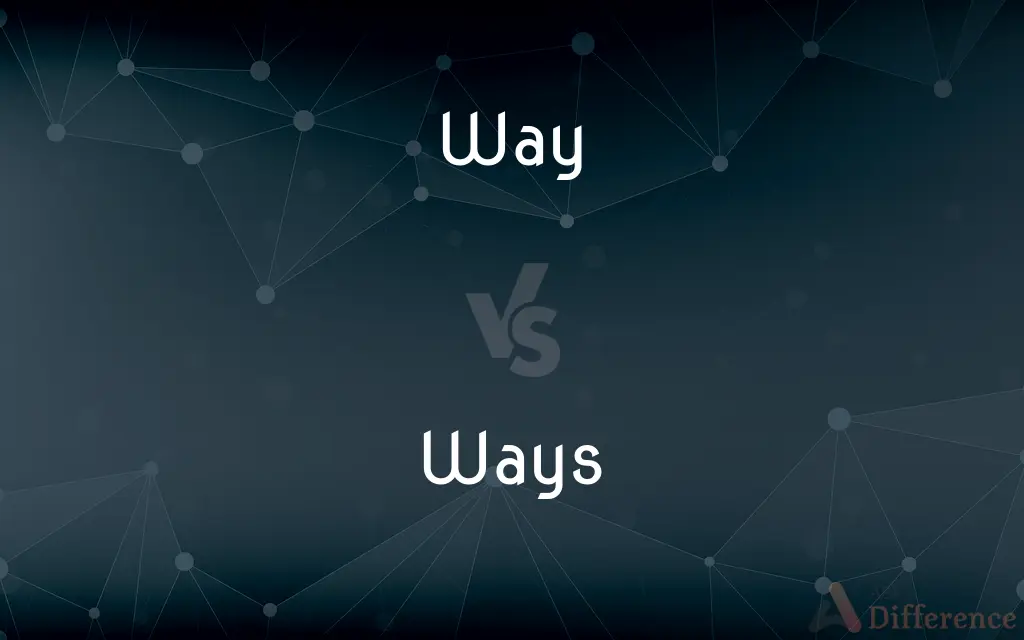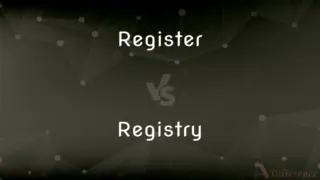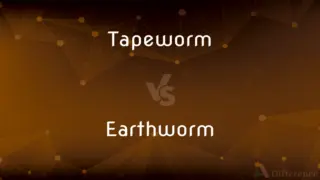Way vs. Ways — What's the Difference?
By Tayyaba Rehman & Urooj Arif — Updated on March 29, 2024
Way refers to a method or manner of doing something, while ways are its plural form, indicating multiple methods or manners.

Difference Between Way and Ways
Table of Contents
ADVERTISEMENT
Key Differences
Way is used to describe a singular method, path, or manner in which something can be done or achieved. It highlights a specific approach or direction. For example, one might seek the best way to solve a problem, focusing on finding a singular, optimal method. Ways, on the other hand, refers to multiple methods, paths, or manners. It implies a variety of options or approaches available to accomplish something. When someone explores different ways to solve a problem, they are considering a range of possible methods.
The use of "way" often implies a focused or singular approach to a situation or problem, suggesting that there might be a most effective path to follow. It can also refer to a physical or metaphorical path leading to a specific destination. In contrast, "ways" suggests diversity and multiplicity in approaches or solutions. It acknowledges that there may be several viable paths or methods to achieve a goal or reach a destination, emphasizing choice and flexibility.
When talking about distance or direction, "way" can be used to indicate a specific route or direction, as in "that's the way to the city." It suggests a particular path among others. "Ways," however, can imply a greater distance or a more significant divergence from a path, as in "it's quite a ways away from here," indicating that the destination is not close by or along a direct path.
In expressions, "way" can carry specific idiomatic meanings, such as in "no way" (meaning impossible or not allowed) or "way to go" (used to express congratulations). These uses highlight its versatility in conveying nuanced meanings. Conversely, "ways" can be part of phrases that emphasize diversity or plurality in methods or approaches, such as in "ways of thinking" or "ways to approach a problem," underscoring the concept of variety and multiple possibilities.
Comparison Chart
Definition
A single method, path, or manner.
Multiple methods, paths, or manners.
ADVERTISEMENT
Connotation
Focuses on a singular approach or solution.
Implies diversity in approaches or solutions.
Usage in Sentences
Used when referring to a specific method or direction.
Used when referring to a variety of methods or directions.
Contextual Meaning
Can imply a preferred or most effective path.
Suggests multiple viable options or paths.
Idiomatic Expressions
Found in idioms implying a singular approach or specific direction.
Rarely found in idiomatic expressions, usually refers to pluralities.
Compare with Definitions
Way
A method, style, or manner of doing something.
The way he explains things makes it easy to understand.
Ways
Different methods, styles, or manners of doing something.
There are several ways to solve this puzzle.
Way
A specific direction.
He went that way after leaving the store.
Ways
Various directions from a specific point.
The city is accessible from all ways.
Way
A particular aspect of something.
I like the way this room is decorated.
Ways
Used to indicate a considerable distance or separation in space or time.
It’s a ways away from my current location.
Way
The correct or appropriate path or method.
You're going about it the wrong way.
Ways
Plural form of way, indicating more than one aspect or area.
We need to look at this problem in different ways.
Way
Distance or progress along a course.
We still have a long way to go before we're finished.
Ways
Different paths or methods leading to a goal.
She’s looking into ways to improve her skills.
Way
A road, path, or highway affording passage from one place to another.
Ways
Plural of way
Way
An opening affording passage
This door is the only way into the attic.
Ways
A distance.
A little ways out
Way
Space to proceed
Cleared the way for the parade.
Ways
The property of distance in general;
It's a long way to Moscow
He went a long ways
Way
Opportunity to advance
Opened the way to peace.
Ways
Structure consisting of a sloping way down to the water from the place where ships are built or repaired
Way
A course that is or may be used in going from one place to another
Tried to find the shortest way home.
Ways
N is between 2 and infinity;
They split the loot four ways
Way
Progress or travel along a certain route or in a specific direction
On her way north.
Way
Often ways (Used with a sing. verb) Informal Distance
The travelers have come a long way. That village is a good ways off.
Way
A course of conduct or action
Tried to take the easy way out of the mess he was in.
Way
A manner or method of doing something
Several ways of solving this problem.
Had no way to reach her.
Way
Used with a personal pronoun as the object of various verbs to indicate progress toward an objective
Elbowed his way through the crowd.
Talked my way into the club.
Worked his way into a better job.
Way
A usual or habitual manner or mode of being, living, or acting
The American way of life.
Way
An individual or personal manner of behaving, acting, or doing
Have it your own way.
Way
A specific direction
He glanced my way.
Way
A participant. Often used in combination
A three-way conversation.
Way
An aspect, particular, or feature
Resembles his father in many ways.
In no way comparable.
Way
Nature or category
Not much in the way of a plot.
Way
Freedom to do as one wishes
If I had my way.
Way
An aptitude or facility
She certainly does have a way with words.
Way
A state or condition
He is in a bad way financially.
Way
Vicinity
Drop in when you're out our way.
Way
Often ways A longitudinal strip on a surface that serves to guide a moving machine part.
Way
Ways (used with a sing. or pl. verb) Nautical The structure on which a ship is built and from which it slides when launched.
Way
(Informal) By a great distance or to a great degree; far
Way off base.
Way too expensive.
Way
(Slang) Very; extremely
"Can they really make a car that's way cool?" (Fortune).
Way
(Informal) From this place; away
Go way.
Way
(Informal) Used in response to no way to indicate affirmation contradicting a negative assertion.
Way
(heading) To do with a place or places.
Way
A road, a direction, a (physical or conceptual) path from one place to another.
Do you know the way to the airport?
Come this way and I'll show you a shortcut.
It's a long way from here.
Way
A means to enter or leave a place.
We got into the cinema through the back way.
Way
A roughly-defined geographical area.
If you're ever 'round this way, come over and visit me.
Way
A method or manner of doing something; a mannerism.
You're going about it the wrong way.
He's known for his quirky ways.
I don't like the way she looks at me.
Way
A state or condition
When I returned home, I found my house and belongings in a most terrible way.
Way
(heading) Personal interaction.
Way
Possibility (usually in the phrases 'any way' and 'no way').
There's no way I'm going to clean up after you.
Way
Determined course; resolved mode of action or conduct.
My little sister always whines until she gets her way.
Way
(Germanic paganism) A tradition within the modern pagan faith of Heathenry, dedication to a specific deity or craft, Way of wyrd, Way of runes, Way of Thor etc.
Way
Speed, progress, momentum.
Way
A degree, an amount, a sense.
In a significant way, crocodiles and alligators are similar.
Way
Acknowledges that a task has been done well, chiefly in expressions of sarcastic congratulation.
Way to ruin the moment, guys.
Way
(plural only) The timbers of shipyard stocks that slope into the water and along which a ship or large boat is launched.
Way
(plural only) The longitudinal guiding surfaces on the bed of a planer, lathe, etc. along which a table or carriage moves.
Way
The letter for the w sound in Pitman shorthand.
Way
Yes; it is true; it is possible
Yes way
Way
(obsolete) To travel.
Way
Much.
I'm way too tired to do that.
I'm a way better singer than Emma.
Way
Very.
I'm way tired.
String theory is way cool, except for the math.
Way
(informal) Far.
I used to live way over there.
The farmhouse is way down the bottom of the hill.
Way
Away.
Way
That by, upon, or along, which one passes or processes; opportunity or room to pass; place of passing; passage; road, street, track, or path of any kind; as, they built a way to the mine.
I shall him seek by way and eke by street.
The way seems difficult, and steep to scale.
The season and ways were very improper for his majesty's forces to march so great a distance.
Way
Length of space; distance; interval; as, a great way; a long way.
And whenever the way seemed long,Or his heart began to fail.
Way
A moving; passage; procession; journey.
I prythee, now, lead the way.
Way
Course or direction of motion or process; tendency of action; advance.
If that way be your walk, you have not far.
And let eternal justice take the way.
Way
The means by which anything is reached, or anything is accomplished; scheme; device; plan.
My best way is to creep under his gaberdine.
By noble ways we conquest will prepare.
What impious ways my wishes took!
Way
Manner; method; mode; fashion; style; as, the way of expressing one's ideas.
Way
Regular course; habitual method of life or action; plan of conduct; mode of dealing.
Her ways are ways of pleasantness, and all her paths are peace.
When men lived in a grander way.
Way
Sphere or scope of observation.
The public ministers that fell in my way.
Way
Determined course; resolved mode of action or conduct; as, to have one's way.
Way
Progress; as, a ship has way.
Way
The longitudinal guides, or guiding surfaces, on the bed of a planer, lathe, or the like, along which a table or carriage moves.
Way
Right of way. See below.
All keep the broad highway, and take delightWith many rather for to go astray.
There is but one road by which to climb up.
When nightDarkens the streets, then wander forth the sonsOf Belial, flown with insolence and wine.
Way
To go or travel to; to go in, as a way or path.
Way
To move; to progress; to go.
On a time as they together wayed.
Way
How something is done or how it happens;
Her dignified manner
His rapid manner of talking
Their nomadic mode of existence
In the characteristic New York style
A lonely way of life
In an abrasive fashion
Way
How a result is obtained or an end is achieved;
A means of control
An example is the best agency of instruction
The true way to success
Way
A journey or passage;
They are on the way
Way
The condition of things generally;
That's the way it is
I felt the same way
Way
A course of conduct;
The path of virtue
We went our separate ways
Our paths in life led us apart
Genius usually follows a revolutionary path
Way
Any artifact consisting of a road or path affording passage from one place to another;
He said he was looking for the way out
Way
A line leading to a place or point;
He looked the other direction
Didn't know the way home
Way
The property of distance in general;
It's a long way to Moscow
He went a long ways
Way
Doing as one pleases or chooses;
If I had my way
Way
A general category of things; used in the expression `in the way of';
They didn't have much in the way of clothing
Way
Space for movement;
Room to pass
Make way for
Hardly enough elbow room to turn around
Way
A portion of something divided into shares;
The split the loot three ways
Way
To a great degree or by a great distance; very much (`right smart' is regional in the United States);
Way over budget
Way off base
The other side of the hill is right smart steeper than the side we are on
Common Curiosities
How does the usage of "way" differ in terms of direction?
"Way" refers to a specific direction or path, emphasizing a singular route.
What is the difference between "way" and "ways"?
"Way" refers to a singular method or path, while "ways" indicates multiple methods or paths.
Is "ways" only used in a literal sense?
No, "ways" can also be used figuratively, referring to various methods or approaches.
How does adding "s" to "way" change its meaning?
Adding "s" changes the focus from a singular to multiple methods, paths, or approaches.
How does "way" function in idiomatic expressions?
In idioms, "way" often conveys specific, nuanced meanings beyond its literal definition.
Does "way" always refer to a physical path?
No, "way" can also refer to methods, manners, or approaches, not just physical paths.
Can "way" and "ways" be used interchangeably?
No, "way" is used for singular references and "ways" for plural or multiple references.
In what context might "ways" be more appropriate than "way"?
"Ways" is more appropriate when discussing multiple methods, approaches, or directions.
Can "way" be used figuratively?
Yes, "way" can be used figuratively to represent a method or manner of doing something.
Can "ways" be part of idiomatic expressions?
It's less common, as "ways" typically refers to multiple methods or paths in a more literal sense.
What implications does using "way" have in a sentence?
Using "way" implies a specific, singular approach or direction.
What does "ways" imply about the options available?
"Ways" implies a variety of options or approaches, highlighting flexibility and choice.
What does it mean when someone says "it's quite a ways away"?
It means the destination is significantly far or not along a direct route.
In what scenario would "way" be more effective than "ways"?
When emphasizing a singular, optimal method or direction.
Why might someone choose "ways" over "way" in a discussion?
To emphasize the availability of multiple options or methods.
Share Your Discovery

Previous Comparison
Register vs. Registry
Next Comparison
Tapeworm vs. EarthwormAuthor Spotlight
Written by
Tayyaba RehmanTayyaba Rehman is a distinguished writer, currently serving as a primary contributor to askdifference.com. As a researcher in semantics and etymology, Tayyaba's passion for the complexity of languages and their distinctions has found a perfect home on the platform. Tayyaba delves into the intricacies of language, distinguishing between commonly confused words and phrases, thereby providing clarity for readers worldwide.
Co-written by
Urooj ArifUrooj is a skilled content writer at Ask Difference, known for her exceptional ability to simplify complex topics into engaging and informative content. With a passion for research and a flair for clear, concise writing, she consistently delivers articles that resonate with our diverse audience.
















































